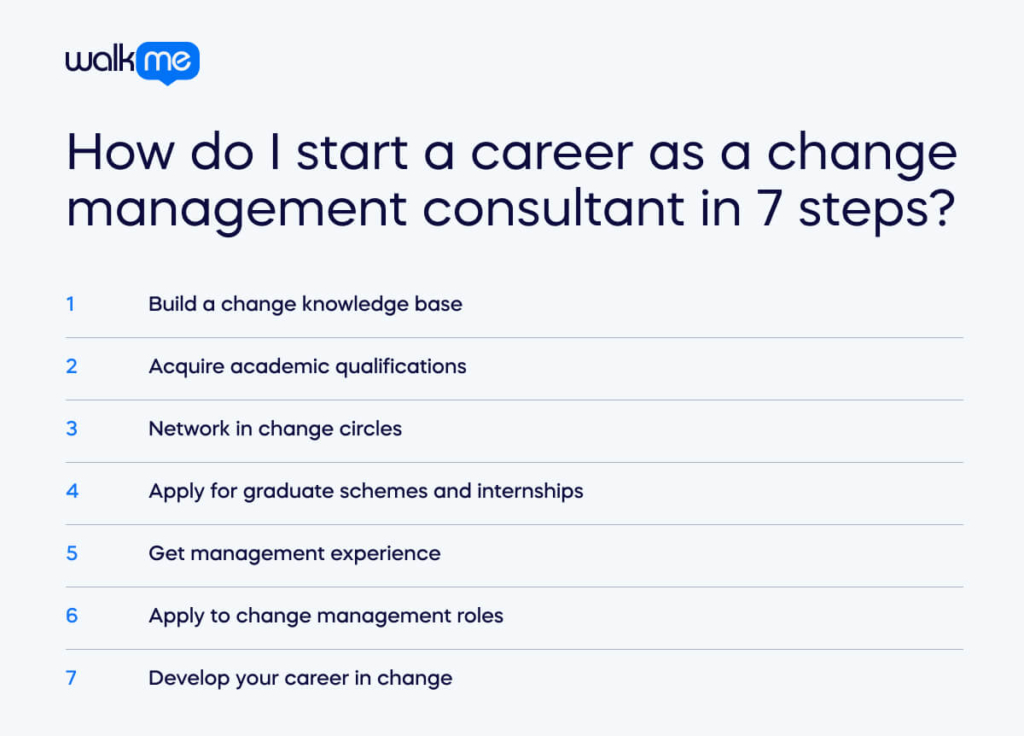The only constant in today’s business market is change. As a result, change management consultants are a more attractive role and in demand asset than ever for individuals and organizations looking to work in or improve their organizational development.

But despite this role seeming simple and highly paid, it is a complex job to support enterprise organizations to manage change. As a result, Forbes reports that 70% of digital transformations fail. Change is an emotionally challenging experience for team members, making managing change successfully emotionally challenging too.
However, when the change management consultant is accomplished effectively, it saves organizations millions, leading to growth and improving staff retention.
To show you what a change management consultant is and how to become one, this article looks at the following topics:
- What is the role of a change management consultant?
- What is the difference between a change management analyst and a consultant?
- Is change management in demand?
- Is change management a hard or soft skill?
- What qualifications do you need to become a change management consultant?
- How do I start a career as a change management consultant in 7 steps?
Let’s begin with the role of a change management consultant.
What is the role of a change management consultant?

What is Change Management Consulting?
The role of a change management consultant is to help businesses streamline the change process during significant transitions, such as digital transformations, by reducing adverse outcomes for internal teams and external stakeholders.
To achieve this, change consultants must carry out the following tasks which are often part of a change management consultant job description:
- Assessing if an organization is prepared for change.
- Strategically adapting communication to deliver messages to the intended audience with maximum reception effectively.
- How to gain support from every level of the organization using excellent interpersonal skills.
- Using a digital adoption platform can help to quicken the process of implementing changes and make it easier for the internal team to understand the transformation.
- Evaluate and prioritize feedback from the individuals impacted by the change using good communication skills.
Now we know the role of a change management consultant, let’s look at the difference between this and a change analyst.
What is the difference between a change management analyst and a change management consultant?
Knowing the difference between a change management analyst and a change consultant is essential to ensure you invest in the right person for the role your organization needs.
The job of a change management analyst involves researching the market and the organization to plan necessary changes. They use tools like Sharepoint to maintain effective communication across the company during the changeover process. The aim is to ensure that everyone is aligned and well-informed.
In this way, we see that change management analysts are similar to change consultants as they have more of a focus on acquiring the data sets for data-driven decisions on change and usually have less experience in managing change. Change consultants are more likely to have more experience driving change and focus more on communication skills, however both roles must be aware of change management strategies to be successful.
It’s helpful to know the difference between a change analyst and a change consultant, whether you want to pivot in your role or consider hiring one for your organization to support change management projects. But it’s also essential to understand the scope in demand of change management.
Is change management in demand?
Statista reports that by 2026, US digital transformation spend will reach USD 3.4 trillion. All this change requires massive amounts of change management at the individual and organizational levels to give companies the competitive edge and achieve ROI.
As a result, change management and change consultants are in demand more than ever, with many people looking to begin their career in change management. The reason is that with technological advancement placing pressures of competition on constant investment in new digital tools, the only constant in today’s business market is changing. Therefore, now is a great time to become or invest in a change management consultant.
Is change management a hard or soft skill?
Managing change is a very emotionally challenging process for staff to experience. Change consultants need excellent soft (experience-based) skills to communicate with staff at different levels to meet all their needs.
However, change initiatives within digital transformations exist to benefit the organization. Therefore, change consultants also need hard (measurable) skills such as data collection to ensure the goals of the change strategy align with organizational goals.
What qualifications do you need to become a change management consultant?
If you’re an undergraduate or MBA student aspiring to become a change management consultant, you should concentrate on strategic and people management in your studies. It’s suggested to take classes related to change management if offered by your program.
Like many people, you may be unsure how to succeed and if this is the case, seek courses to help you develop the necessary skills. These classes should focus on crisis communication, strategic planning, team management, organizational behavior, and optimizing corporate operations. Additionally, consulting an academic adviser before enrolling in any courses is recommended.
If you work professionally, you may want to take a continuing education course in change management. Some notable schools that offer this type of course, are Cornell, Emory, Northwestern, and MIT.
Taking a change management course can enhance your knowledge and demonstrate your preparedness for your new job to potential employers. Free change management classes are available on online platforms such as Coursera or Alison if you cannot pay for a course.
Now that you understand the qualifications you need to become a change management consultant let’s look at how to start your career in change.
How do I start a career as a change management consultant in 7 steps?

There are seven steps to follow if you are looking to become a change management consultant. The first is to build a knowledge base on change.
1. Build a change knowledge base
To support their staff to adapt to a change, a company can undergo change management. A change management strategy involves strategizing ways to support employees as they adopt new methods, gathering data on the change’s success, and implementing a transition period to ensure the change is manageable.
However, planning transition periods and gradually introducing changes according to theoretical models can be difficult. Therefore, doing as much research on change mdoanagement models as possible before studying for qualification is best.
2. Acquire academic qualifications
To enhance your job prospects and meet academic standards, consider obtaining an undergraduate degree in one of the following fields:
- Management.
- Business.
- A field focused on personnel and strategic direction.
While not mandatory, having a degree or specialization in change management can significantly bolster your application.
3. Network in change circles
Attending university is a great chance to establish valuable connections with peers and professors. These individuals can help you with letters of recommendation, referrals, and mentorship, which are crucial to advancing your career. Networks are also beneficial for collectively supporting each other’s career growth by exchanging ideas and discussing strategies to enhance your management skills.
4. Apply for graduate schemes and internships
It is crucial to prioritize the last years of your degree as they are significant for applying to time-sensitive opportunities, including internships and graduate schemes. Internships offer temporary work experience with a company, while graduate schemes at consultancy firms are advertised during specific periods in the academic year.
5. Get management experience
It would be beneficial to gain experience in management consulting before pursuing a career in change management consultancy. You may be able to begin in change management directly by finding a suitable graduate program, but if not, starting in a more general management consultant role can help you gain experience and establish trust with a company. This can, in turn, help you specialize in change management.
6. Apply to change management roles
Once you have gained enough experience, you can explore change management positions within and outside your company. If your employer does not offer any support to specialize in this field, consider looking for other firms with such programs or opportunities.
7. Develop your career in change
Consultancy firms operate as corporate businesses that use a performance-based structure for promotions. To advance in your career, you should perform well and produce measurable results that result in benefits and bonuses. You can pursue specialized roles in change management consulting and senior/executive management by taking on additional responsibilities.
Focus on the human experience to become a valuable change consultant
Qualifications and experience are essential to becoming a change management consultant but don’t forget you are supporting people, not technology. The basis of change management is human psychology, not management techniques.
Change, like the human mind, is complex and requires high-level communication skills driven by empathy. Empathise with the staff experiencing change to understand and guide their experiences to embrace change to contribute positively to their organization.
If you are an empathetic person, you have the potential to become an excellent change management consultant, leading organizations to successful digital transformations, increased revenue, and continuous growth.
FAQs
Is change management a good career path?
If you’re considering a career in a field that is currently on the rise, change management is an excellent option. With the increased digitalization, remote work opportunities, and changing customer demands, businesses are constantly evolving. This environment has created a great opportunity for change managers to make an impact.
What is the average age of a change management consultant?
Change management consultants are usually senior leaders with a large amount of management experience in the field of digital transformation. Zippia shows the average of white, black or african american male or female change management consultants to be 43-45. However, whatever age you are, you should apply for this role, as it is based on experience, not age.

